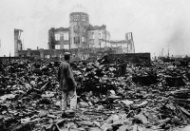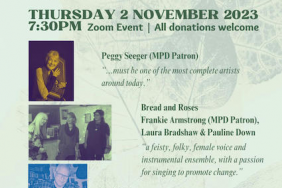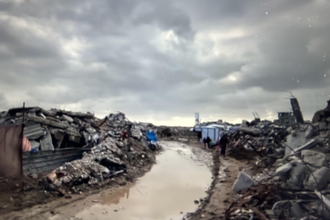Viewpoint: Will faith communities help galvanize movement for nuclear abolition in UK?

In December 2014, as part of my ongoing research into Hiroshima survivors, I attended the Vienna Conference on the Humanitarian Effects of Nuclear Weapons. At the conference, the World Council of Churches issued a joint statement on the humanitarian impact of nuclear weapons, signed by Christians, Buddhists, Hindhus and Muslims, stating that: 'Nothing more decisively threatens this fabric of life than nuclear weapons, their proliferation and the grim possibility of their use. Whether such use is by decision, miscalculation or nihilistic madness is irrelevant, the outcome will be one and the same.'
The statement also pointed to the 'mutual suspicion mistrust and fear which undergirded the logic of nuclear deterrence,' saying that 'this mistrust still holds sway, exerting a more powerful influence in international relations.'
In conclusion it made five pledges that, to communicate within our respective faith communities the inhumane and immoral nature of nuclear weapons...and engage in dialogue with people of other faiths to raise awareness of the moral imperative.' It also encouraged people of faith to 'heed the voices of the world's hibakusha (atomic bomb survivors) who have been urging complete abolition of nuclear weapons in order to prevent their suffering from being visited on any other individual, family or society' as well as to 'work with the international community to fully utilize the emerging process including successive joint statements on the humanitarian impact of nuclear weapons... and call for the commencements of negotiation by states on a new legal instrument to prohibits nuclear weapons without further delay.'
During the first part of this year, I have engaged with my own Buddhist faith community - sending 10,000 folded paper cranes to Hiroshima and Nagasaki this summer for the 70th anniversary of the dropping of the atomic bomb, whilst also facilitating a hibakusha grandmother and granddaughter to give their experiences to the Quaker Peace and Social Witness Interfaith Service held on 6th August at Friends House.
At the same venue, the Campaign for Nuclear Disarmament (CND) hosted a touring party of hibakusha from Hiroshima who gave their experiences on 12th October. "Nuclear weapons do not allow humans to live or die humanly," said Kuniko Kimura, Assistant Secretary General of Chiba Association of Atomic Bomb Survivors at that conference: "We humans may initiate a war but at the same time we can create and maintain peace. In order to ensure no more hibakusha anywhere in the world and to leave our children a peaceful and beautiful planet, please join in our call for 'No war! Abolition of Nuclear weapons!'"
Kuniko was in fact only five years old at the time of the atomic bombing. She apologized that she did not have a full recollection of events around that time. One of the motivations for my research is that survivors from Hiroshima are getting older and older, there are fewer who are alive and well enough to remember the event. The 75th anniversary in 2020 will be the absolutely last chance.
The Quaker Disarmament Affairs office were also running a faith workshop at the CND conference 17-18 October, which I attended. This was said to be the first conference for 'a generation' according to CND director Kate Hudson, to be so well-attended. This was partly due to hundreds of new members who have joined since Jeremy Corbyn became the leader of the Labour party. Jeremy didn't talk to us directly on Sunday as planned, but it didn't stop him attending a side event informally, in order to accept his new position as Vice Chair of CND.
At the Sunday Interfaith workshop organized by Tim Wallis of the Quakers Disarmament Affairs several said they had recently joined CND - we heard from members of the Baptist church, Church of England, Catholics, as well as the Buddhist group, SGI-UK. I enjoyed the workshop role play where we had to role-play someone who believed in Britain's nuclear deterrent and get them to see things from another point of view.
Steve Hucklesby, Policy Adviser for the Joint Public Issues Team serving the Methodist Church, the Baptist Union of Great Britain and the United Reformed Church, summarized recent activities at a high-profile level working with people of faith in the UK on nuclear weapons abolition. He highlighted the Women's International League for Peace and Freedom (WILPF) who hold their 100th anniversary this year, wove together 11,000 pieces of a seven-mile woollen scarf stretching from Aldermaston to Burghfield in August 2014. The scarf - split into one-mile sections, with one whole mile knitted by people of faith is a huge testament to the strength of feeling in this country. In fact, it was at an evening event hosted by WILPF that Jeremy Corbyn did make an appearance. He was able to offer his perspective on nuclear weapons there, telling us he felt the debate on nuclear weapons centred around questions of 'what is security' and whether people really wanted to live in the world where they threatened one another with nuclear weapons all the time. He mentioned that he and his brother were the first Shropshire members of CND back in 1966 and said that it was attending a CND march in the capital that year which opened his eyes and ears to the possibility of living in a world without nuclear weapons.
Hucklesby's work involves briefings for senior faith leaders around the world, working for instance with the London Muslim Centre and Bruce Kent on a talk titled No Faith in Trident last year. A statement on nuclear weapons was also published in the Times this year, signed by 26 senior faith leaders.
The mood of the 2015 CND conference was positive, due to increasing membership. Bruce Kent, former Chair of CND during the 1980s and its informal spiritual adviser, inspired us to take on the message of the hibakusha, saying that when he was looking for places for hibakusha to stay in October, several families in his neighbourhood came forward: "they (my neighbours) understand why we need to ban nuclear weapons." He told the conference there had never been a more opportune time to campaign for nuclear disarmament reminding us of US Jesuit Richard McSorley who said: "the taproot of violence in our society today is in our intent to use nuclear weapons. Once we have agreed to that, all other evil is minor n comparison. Once we fairly face the question of consent to use nuclear weapons, any hope of large scale improvement of public morality is doomed to failure."
A supporter of Trident Ploughshares, who organized the creative opposition to Trident, Faslane 365, a yearlong blockade of the Scottish nuclear weapons base, spoke of the fact that in the last year Christian CND had organized a sponsored fast with groups across Europe, and another had staged a ten person die-in outside the Ministry of Defence. Christian CND also flagged up the opportunity to lobby parliament on November 4th, when Catholic Christian CND have organized a Nuclear Exits meeting with Pax Christi, the Quakers and ICAN at Committee Room 15 between 5 and 7pm - see http://ccnd.gn.apc.org as well as http://Twitter.com/Christian CND
Kate Hudson, director of CND spoke of the priorities for CND within the next year, the focus being very much about campaigning against Trident in advance of what is known as the 'maingate' decision to be made about renewal of trident in March 2016. A vote was originally promised on this by Tony Blair in 2007, however as Hudson pointed out, the government could simply make the decision to go ahead without a vote. If that were to be the case, what would CND's position be? The legality of replacing Trident is hotly contested. Critics argue that by replacing their nuclear forces, the recognised nuclear powers, including the UK, are failing to meet their disarmament obligations under Article VI of the Nuclear Non-Proliferation Treaty (NPT).
If the government does go ahead with trident renewal next year, CND can take heart that there now also a worldwide movement, the International Campaign to Abolish Nuclear Weapons (ICAN) - supported by many faith groups worldwide, which backs the humanitarian pledge lodged by the Austrian government at the UN General Assembly. This movement -- see www.icanw.org -- arose partly as a result of the perceived failure of the Nuclear Non- Proliferation Treaty, signed back in 1970 and sets a goal of negotiating toward nuclear abolition without a timetable, has met every five years to review its progress ever since. It is worth noting that he UK was not simply a signatory but also a key drafter of the treaty.
This year, the Non-Proliferation Review Conference in May, failed once again to deliver a conclusive statement on disarmament, with Israel once again refusing to participate. Several non-nuclear weapons states also failed to turn up to the debates, partly as a result of the cost of travelling to New York. The UK prides itself in being a leader on human rights and international law, and yet it has so far not signed the humanitarian pledge or indeed commented in any significant way on what seems to be the current failure of the NPT.
As ICAN point out, nuclear deterrence is a myth; the possession of nuclear weapons by some states is a deterrent to others getting rid of their nuclear weapons, as recent developments around the world clearly indicate. ICAN is therefore a great complement to, rather than a rival to CND's long and noble tradition of campaigning, dating back to the days of Bertrand Russell, when the UK still had a lively moral and intellectual debate about the possession of nuclear weapons.
ICAN is a young but successful single issue international campaign - with near global reach in just a few years of its existence, riding on the back of other global disarmament campaigns; including the chemical weapons convention as well as, in the 1990s, the cluster munitions and anti-personnel device conventions. Meanwhile CND has a much wider and more comprehensive agenda on security and energy; but it can gain strength form ICAN's global success spearheaded by non- nuclear weapons states. The two movements need to work closely to support one another at a local and a global level: after all CND is also a global brand name - Russell and Einstein's famous manifesto and Pugwash conferences ensured that was the case. The moral legitimacy that CND carried in the 1950s and 1980s could be significantly amplified by its proud association with ICAN's diverse, flexible organization with celebrity backers; whilst ICAN stands to gain from the long haul, gradualist approach of CND. With CND's recent success, in the last two months hundreds of people have joined CND or renewed their membership and new wind in both organizations' sails, who knows but they could become a dynamic force for good?


















